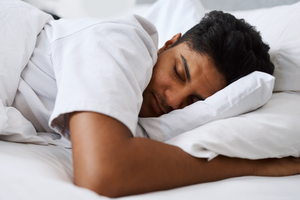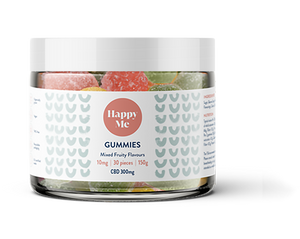Recommended products for sleep

What causes sleep issues?
Sleep can be disturbed in different ways; some struggle to fall asleep and others have difficulty in staying asleep or have long periods of wakefulness in the night. Disturbed sleep can be caused by
- Stress and Anxiety: Psychological factors, such as stress, anxiety, or excessive worrying, can make it difficult to relax and fall asleep. Racing thoughts and an overactive mind can interfere with the ability to achieve a calm and peaceful state for sleep.
- Poor Sleep Habits: Irregular sleep schedules, inconsistent bedtime routines, excessive caffeine or alcohol consumption, and exposure to electronic devices before bed can disrupt the body's natural sleep-wake cycle and make it harder to fall asleep.
- Medical Conditions: Certain medical conditions can impact sleep quality, such as insomnia, sleep apnea, restless legs syndrome, chronic pain, or mental health factors like depression or post-traumatic stress disorder (PTSD).
- Medications: Some medications can affect sleep patterns as a side effect. It's important to consult with a healthcare professional if you suspect your medications are interfering with your sleep.
- Environmental Factors: Noise, light, an uncomfortable sleeping environment, or extreme temperatures can all disturb sleep and prevent the body from entering a deep, restorative sleep stage.
- Aging: As we age, natural changes in sleep patterns can occur. Older adults may experience more fragmented sleep, lighter sleep, and more frequent awakenings throughout the night.
- Female Hormones: Oestrogen and progesterone play a significant role in regulating sleep patterns. Fluctuations in hormone levels throughout the menstrual cycle, as well as during the menopause, can contribute to sleep issues in women.

CBD and sleep research
Research suggests that CBD could have a positive effect on sleep and particularly when sleep is disrupted due to anxiety, stress and/ or pain.
Research published in 2019 looked at whether CBD could improve sleep and/or reduce anxiety. In the first month of this research, 79.2 percent of the patients reported lower anxiety levels and 66.7 percent reported better sleep. This same study also found that some people had lowered cortisol levels. Cortisol is a stress hormone which usually peaks in the morning, having elevated cortisol at night can increase wakefulness and impact sleep quality.
The authors of this 2015 review, found evidence to suggest that CBD could be an effective treatment for numerous types of anxiety disorders, which can have an impact on sleep.

CBD, sleep and pain
CBD may have a positive impact on both sleep and pain management, making it a potential option for individuals experiencing sleep disturbances due to pain.
CBD has been reported to have analgesic (pain-relieving) properties, which can help alleviate discomfort associated with various conditions, including chronic pain. By interacting with receptors in the endocannabinoid system (ECS) and modulating pain signaling, CBD may help reduce pain perception and inflammation, promoting a more comfortable state conducive to sleep.
Improved pain management can contribute to better sleep quality. Chronic pain can disrupt sleep patterns, making it challenging to fall asleep or stay asleep throughout the night. By addressing the underlying pain issues, CBD may help individuals experience more restful and uninterrupted sleep.
In a 2018 report the authors noted that there is evidence to support the claim that CBD soothes pain and in reducing chronic pain, CBD could improve sleep. It is worth noting that several of the studies reference regular CBD usage to improve pain and sleep.
Q&A on CBD for sleep
What's the best CBD dose for sleep?
The optimal CBD dose for sleep can vary from person to person, as everyone's body chemistry and response to CBD can be different. Factors such as body weight, metabolism, and the severity of sleep issues can impact the ideal dosage. It's generally recommended to start with a low dose and gradually increase until the desired effects are achieved.
For sleep, a common starting dose is around 10-20mg of CBD taken orally. However, some individuals may find relief with lower doses, while others may require higher doses. It's important to find the right balance that works for you.
Keep in mind that CBD may take time to build up in your system, so it's advisable to be consistent with your dosing and give it a few weeks to assess the effects on your sleep quality. Enter your details into our CBD dosage calculator to find out your personalised recommended dosage.
Can I use CBD gummies for sleep?
Yes, CBD gummies can be a convenient and enjoyable way to incorporate CBD into your bedtime routine for sleep support. CBD gummies typically come in pre-dosed servings, making it easy to know how much CBD you are consuming with each gummy.
When selecting CBD gummies for sleep, it's important to consider the CBD dosage per gummy and choose a product that aligns with your desired dosage. Start with a low dose and gradually increase if needed. It's recommended to follow the manufacturer's instructions and guidelines for dosing.
Keep in mind that CBD gummies may take longer to take effect compared to CBD oil, as they need to be digested and metabolised by the body. It's advisable to take them about an hour before bed to allow sufficient time for the effects to kick in.
Additionally, it's important to choose CBD gummies from a reputable brand that provides third-party lab testing to ensure the accuracy of CBD content and to verify that the product is free from contaminants.
Does CBD affect deep sleep?
CBD may potentially affect deep sleep in a positive way for some individuals. Deep sleep, also known as slow-wave sleep, is an important stage of the sleep cycle that is crucial for physical restoration and rejuvenation.
CBD has been suggested to have calming and relaxing effects, which may contribute to improved sleep quality, including deeper sleep. By reducing anxiety, promoting relaxation, and easing physical discomfort, CBD may help create an environment conducive to experiencing longer and more restful periods of deep sleep.
Furthermore, CBD's interaction with the endocannabinoid system (ECS) may play a role in regulating sleep cycles. The ECS helps maintain balance in various physiological functions, including sleep. CBD's influence on the ECS may contribute to promoting a more balanced sleep-wake cycle, potentially enhancing the duration and quality of deep sleep.
It's important to note that the effects of CBD on deep sleep can vary among individuals. Some people may experience improvements in deep sleep, while others may not notice significant changes. Factors such as dosage, individual body chemistry, and the underlying causes of sleep issues can impact CBD's effects on deep sleep.
Does CBD increase dreaming?
CBD may have the potential to affect dreaming, although the research in this area is limited. Some anecdotal reports suggest that CBD can impact dreams, while others may not notice any changes. The endocannabinoid system, which interacts with CBD, is involved in regulating sleep cycles and dream patterns.
CBD's calming and anxiety-reducing properties may potentially contribute to more restful sleep, including REM (rapid eye movement) sleep, which is the stage associated with vivid dreaming. By promoting relaxation and reducing anxiety, CBD might indirectly influence dream patterns.
However, it's important to note that individual responses to CBD can vary, and more scientific studies are needed to fully understand the effects of CBD on dreaming.
Can I use CBD for sleep and restless leg syndrome?
CBD may offer potential benefits for sleep disturbances related to restless legs syndrome (RLS). RLS is a neurological condition characterised by an uncontrollable urge to move the legs, often accompanied by uncomfortable sensations. This condition can disrupt sleep and make it difficult to fall asleep or stay asleep.
CBD's potential mechanisms of action, such as its interaction with the endocannabinoid system (ECS) and its anti-inflammatory properties may play a role in managing RLS symptoms and improving sleep quality. Inflammation has been suggested as a contributing factor in RLS, and CBD's potential anti-inflammatory effects may help reduce inflammation and improve overall comfort.
However, it's important to note that the research on CBD specifically for RLS is limited, and more studies are needed to fully understand its efficacy. It's recommended to consult with a healthcare professional for personalised advice and to explore comprehensive approaches to managing RLS symptoms, including lifestyle modifications and potential medications, in conjunction with CBD.
Can I use CBD for sleep and muscle recovery?
CBD may offer potential benefits for sleep and muscle recovery, as it has been found to have properties that could aid in both areas.
Sleep plays a crucial role in muscle recovery, as it is during sleep that the body repairs and rebuilds tissues, including muscles. CBD has been reported to promote relaxation and improve sleep quality by reducing anxiety and easing discomfort, which can contribute to better restorative sleep.
CBD's potential anti-inflammatory properties may also be beneficial for muscle recovery. Intense exercise or physical activity can lead to inflammation and muscle soreness. CBD has shown promise in reducing inflammation by interacting with the body's endocannabinoid system and influencing certain receptors involved in the immune response. By reducing inflammation, CBD may help speed up the recovery process and alleviate muscle soreness.
Additionally, CBD's analgesic (pain-relieving) effects may help manage discomfort associated with muscle soreness, allowing for a more restful sleep and aiding in the recovery process.
Is CBD good for sleep for seniors?
CBD may be beneficial for seniors experiencing sleep issues. As we age, sleep patterns can change, and conditions like insomnia or difficulty staying asleep can become more common. CBD's potential effects on sleep quality and relaxation make it a topic of interest for seniors seeking sleep support.
CBD may promote better sleep by reducing anxiety and stress, which are common contributors to sleep disturbances. It may also help ease physical discomfort, such as pain or inflammation, which can interfere with sleep. By addressing these underlying factors, CBD can create a more conducive environment for restful sleep.
Furthermore, CBD's interaction with the endocannabinoid system (ECS) may help regulate sleep-wake cycles and promote a more balanced sleep pattern. The ECS plays a role in maintaining various physiological functions, including sleep regulation.
When considering CBD for sleep, it's advisable to start with a low dosage and gradually increase as needed. Consulting with a healthcare professional is recommended, especially if you have any underlying health conditions or if you take other medications, as they can provide personalised guidance and help ensure CBD is a safe and suitable option for your specific circumstances.














